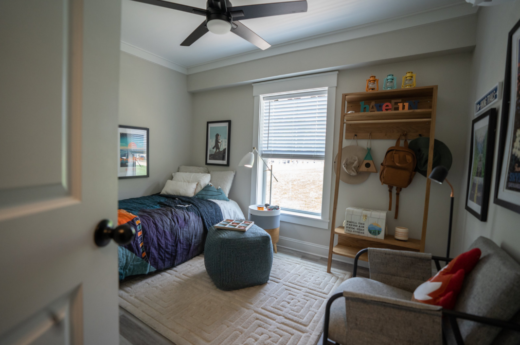Spotlight PA is an independent, nonpartisan, and nonprofit newsroom producing investigative and public-service journalism that holds power to account and drives positive change in Pennsylvania. Sign up for our free newsletters.
By Stephen Caruso & Charlotte Keith | Spotlight PA
Housing is often considered a local issue, but there is a growing consensus in Harrisburg that state-level action is necessary to combat Pennsylvania’s persistent shortages and rising costs.
That shift can be seen in Democratic Gov. Josh Shapiro’s budget proposal, which would put $80 million toward funding public legal defense against evictions and anti-homelessness initiatives, and restarting a popular home repair grant program. It can also be seen in pending legislation that would preempt local zoning policies to spur housing construction and protect tenants amid increased evictions post-pandemic.
These policy changes aren’t a sure thing. Lawmakers who support them will likely face opposition from the lobbies representing municipal governments and landlords.
But the size and scope of the state’s housing shortfall makes doing nothing unpalatable for lawmakers in both major parties. By one estimate, Pennsylvania has a shortage of almost 100,000 housing units.
The state will be hard-pressed to achieve its goals around economic competitiveness and education without addressing that deficit, said Dana Hanchin, CEO of Lancaster-based HDC MidAtlantic, a nonprofit developer of affordable housing.
“We are constantly falling behind in meeting that need because of the systems that we have in place right now,” she said. The governor’s proposed budget is a start, Hanchin said, but “we need to be doing a lot more than we are to stop treading water or losing ground.”
Here’s a breakdown of Shapiro and the legislature’s proposals:
More funds for an affordable housing program
Last year, Shapiro successfully pushed to expand a state program that gives older and disabled Pennsylvanians a partial refund on their rent and property taxes.
Now, he is taking aim at other housing challenges.
Additional funding for a statewide affordable housing program is one of the biggest.
Created in 2010, the Pennsylvania Housing Affordability and Rehabilitation Enhancement Fund provides grants to local governments, nonprofits, and developers to build affordable housing, provide rental assistance, and pay for home repairs, among other uses.
“It is the most flexible funding the commonwealth has in housing,” Robin Wiessmann, executive director of the Pennsylvania Housing Finance Agency, which runs the program, told lawmakers during a budget hearing in February. “It’s driven by community needs.”
The program receives three times as many applications as it can fund, Wiessmann said.
It has previously received bipartisan support: Lawmakers increased the program’s funding cap from $40 million to $60 million in 2022.
Shapiro wants to replace the program’s current funding formula, which is tied to revenues from a state tax on real estate transactions, with a guaranteed amount each year. Under his proposal, that allocation would increase to $70 million in the next fiscal year and rise to $100 million over the next four fiscal years.
Home repairs, homelessness, emergency housing
Shapiro also wants to direct $50 million to a popular state program that helps homeowners pay for essential repairs. The money can also be used to make units accessible for people with disabilities, improve energy efficiency, and provide construction-related workforce training.
Since it launched last year, the Whole-Homes Repair program has faced overwhelming demand, which has led to application windows as short as 24 hours in some counties and long waitlists.
The program was due to receive more funding in last year’s state budget, but lawmakers failed for months to reach a deal on additional legislation to allow the money to be spent. The final deal on those bills, reached in December, did not include more funding for the home repair program.
Shapiro is also proposing an extra $10 million for a program that addresses homelessness, an increase of more than 50%. The initiative has been flat-funded since at least 2016.
The governor’s budget proposal would additionally direct $5 million toward a new program that would rehouse people after natural disasters and other emergencies when other forms of state and federal aid might not be immediately available.
Eviction protections
The number of eviction cases filed in Pennsylvania dropped by more than 40% between 2019 and 2021 — the result of pandemic-era eviction bans and billions in rental assistance to help struggling tenants.
But those protections have now expired and the funding has been exhausted. In 2023, there were more eviction filings in Pennsylvania than in any year since 2019, according to state court data tracked by the Legal Services Corporation, a congressionally-established nonprofit.
Unlike in criminal proceedings, defendants in civil cases such as evictions aren’t guaranteed a right to an attorney. That leaves landlords far more likely than tenants to have legal representation during eviction proceedings.
Providing legal representation for low-income tenants across the state, as four other states have done, would cost Pennsylvania about $23 million per year, according to a 2021 study commissioned by the Pennsylvania Legal Aid Network.
Such an investment, the study found, would save public dollars because fewer evictions would lead to less spending on homelessness, foster care, and emergency health care.
Philadelphia enacted a law in 2019 that guarantees free legal representation to low-income tenants facing eviction cases in certain zip codes. Those tenants had better outcomes in court and were less likely to have to leave their homes, a report analyzing the law found. Some attorneys for landlords said that having both sides represented made the whole process work more smoothly, according to the report.
In his budget address, Shapiro cited Phildaelphia’s “exceptional work” on eviction prevention as an example for the rest of the state. The governor wants to spend $5 million to match funding for legal representation provided by cities and counties. The Shapiro administration has not yet released specifics on how the limited funding would be prioritized.
In the Democratic-controlled state House, lawmakers have also proposed sealing eviction records.
Exact bill language has not yet been drafted. But proponents argue that eviction filings paint an incomplete picture of the circumstances and can ruin a tenant’s future chances of finding new housing, even if a judge later rules in their favor or if the tenant was a minor at the time.
“The only thing we know for sure about eviction records is that once a tenant has an eviction record, it becomes infinitely more difficult for them to gain access to safe and affordable housing,” Dominique Wiggins, a housing attorney at Philadelphia-based Community Legal Services, said at a news conference in November.
Wiggins added the weight of such a record may discourage tenants from using their right to withhold rent if their apartment is in need of necessary repairs — for instance, if it has no working gas connection.
Sealing, however, has already raised concerns with landlords.
Paul Cohen, a Philadelphia-based real estate attorney who works with landlords of all sizes and is himself a former landlord, told Spotlight PA that too many regulations could overwhelm property owners.
In Philadelphia, Cohen noted, landlords are already required to participate in a diversion program to prevent evictions. It mandates that the owner and tenant engage in 30 days of mediation before the owner moves forward with an eviction filing.
Philadelphia City Council started the program during the pandemic and has since extended it. But looking at lawmakers’ initial proposal on sealing eviction records, Cohen argued that if eviction records are sealed from view, landlords shouldn’t have to delay filing for an eviction and risk losing another month’s rent.
Sealing isn’t the only tenant protection legislation state Democrats have pitched. They’ve also floated proposals to limit the size of renters’ security deposits, provide advance notice of when an eviction will take place, and implement rent control.
Taking it all in, Cohen said that landlords are protective of their future profitability.
“Putting all these regulations and all these tenant protections and all these other things out there — it’s wonderful. It’s a great ideal,” he told Spotlight PA. “But at the end of the day, you’re not going to have landlords wanting to own property in Pennsylvania.”
Land use
There is also growing bipartisan interest in one more area — changing Pennsylvania’s building codes and zoning laws. The latter dictate how local governments control what is built and where buildings can be located within their municipal boundaries.
State Democrats and Republicans have introduced at least a dozen proposals this legislative session that would loosen these laws — through preemption or incentives — to encourage housing construction and reduce prices.
These include bills that would redevelop vacant shopping malls or office parks into mixed-use communities, add tiny homes into the state’s construction codes, and allow multi-family homes in areas zoned for single-family residence.
Adjusting the state’s land use policies is also backed by a wide swathe of organizations, including the state Chamber of Business and Industry; the trade groups that represent apartment builders and other developers; and a number of urbanist community organizations.
Among the broadest bills is an omnibus proposal from state Sen. John DiSanto (R., Dauphin), who has a financial stake in multiple construction and development firms.
In a memo asking for his colleagues’ support, he wrote that he wants to allow “the automatic right” to use manufactured housing and accessory dwelling units in single-family zoning districts; allow medium-density housing in all large municipalities; and limit parking requirements.
“By curtailing exclusionary land use barriers and allowing market forces to operate, we will encourage the development of communities that our residents want, at a price they can afford,” DiSanto argued.
Such proposals will likely be opposed by a number of state associations that represent local governments, a little-noted but influential lobby that shapes legislative debates on everything from broadband to workplace safety.
Dave Sanko, executive director of the Pennsylvania State Association of Township Supervisors, told Spotlight PA that everything housing advocates want is already possible if their local officials approve it. That control, he argued, is key.
“It’s not new for the builders and the realtors to be opposed to any local intervention, they’d much rather not have any rules,” Sanko said. “So that part is not new … nor is really Harrisburg saying ‘We know better than you, we’re going to make one set of rules for everybody.’”
But state Sen. Nikil Saval (D., Philadelphia), a progressive who focuses on housing issues and supports DiSanto’s proposal, argued that forcing every new project to undergo local review gives extra power to those with the time and resources to sit on or lobby those boards.
“We have to look at the greater good that makes planning and land use decisions a collective concern,” he said.
BEFORE YOU GO… If you learned something from this article, pay it forward and contribute to Spotlight PA at spotlightpa.org/donate. Spotlight PA is funded by foundations and readers like you who are committed to accountability journalism that gets results.









